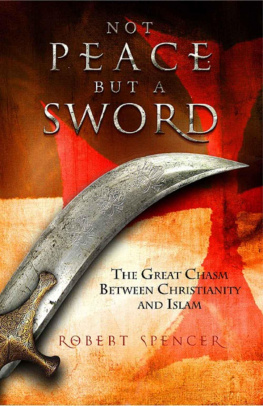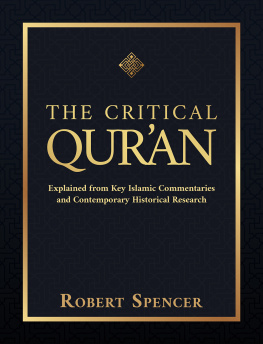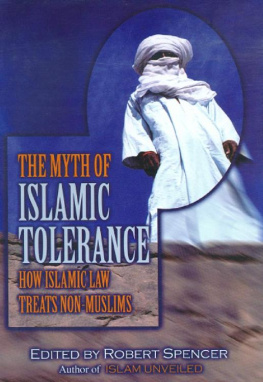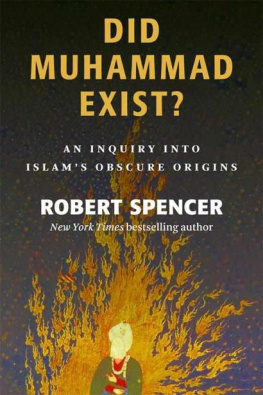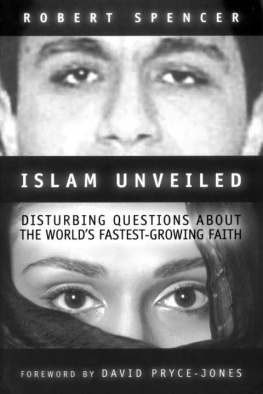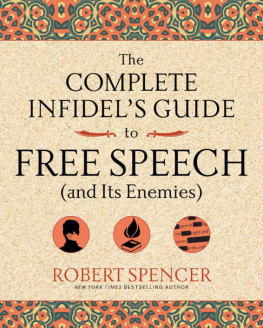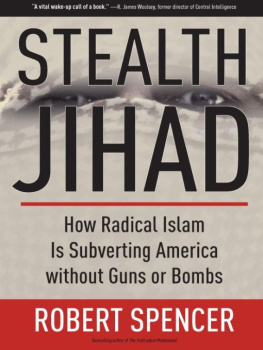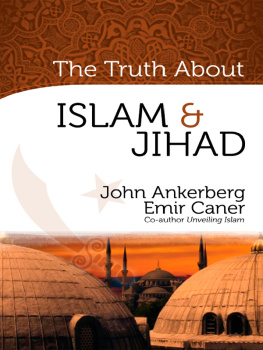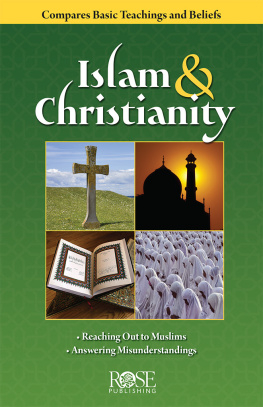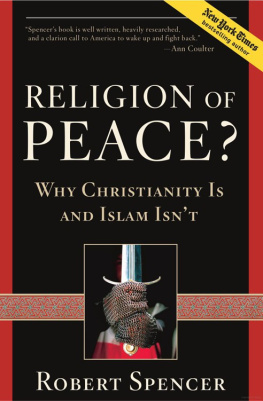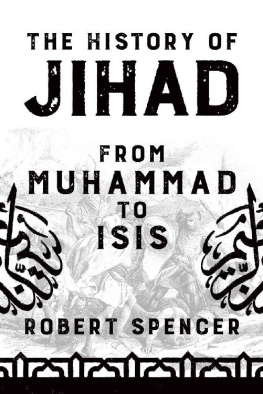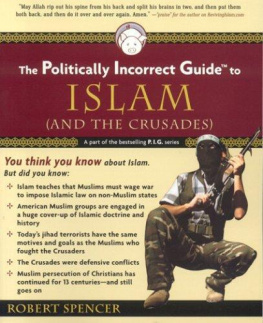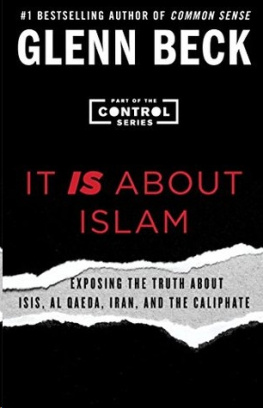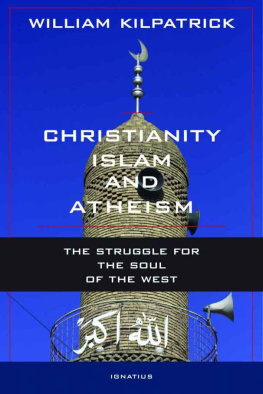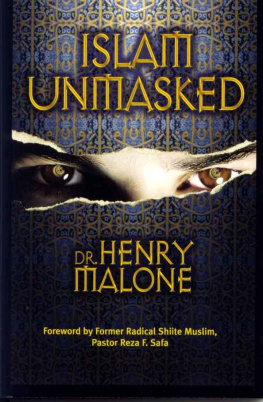R OBERT S PENCER
Not Peace but a Sword
The Great Chasm Between Christianity and Islam
Catholic
Answers
Press
San Diego
2013
Not Peace but a Sword
The Great Chasm Between Christianity and Islam
2013 by Robert Spencer
All rights reserved. Except for quotations, no part of this book may be reproduced or transmitted in any form or by any means, electronic or mechanical, including photocopying, recording, uploading to the Internet, or by any information storage and retrieval system, without written permission from the publisher.
Unless otherwise noted, biblical citations are taken from the Revised Standard Version of the Bible ( 1971 by Division of Christian Education of the National Council of the Churches of Christ in the United States of America).
Published by Catholic Answers, Inc.
2020 Gillespie Way
El Cajon, California 92020
1-888-291-8000 orders
619-387-7200 office
catholic.com
ISBN 978-1-938983-21-4
All italics added for emphasis in citations from Scripture and ancient texts are the authors.
In memory of the Christian martyrs of Islamic jihad, known and unknown.
Your martyrs, O Lord, received the crown of immortality from you, O our God, on account of their struggle. Armed with your strength, they have vanquished their persecutors and crushed the powerless arrogance of demons. Through their intercessions, O Christ God, save our souls.
This book would not have been written were it not for Todd M. Aglialoro, who conceived of it, encouraged me to write it, smoothed out its infelicities, and ably saw it through to completion. I am grateful for his patience and his keen eye. Thanks also to Fr. Thomas P. Steinmetz, a priest of priests, and to the many Catholic and Orthodox believers from the Middle East who discussed the issues in this book with me. Though I cannot name them for unfortunate but unavoidable reasons, I am deeply grateful for their insights.
Introduction
Vile Heretics, Separated Brethren, or Something Else?
Cant we all just get along? Maybe not. And if not, what then?
A book about the differences, rather than similarities, of two religious traditions, and how in certain important ways we may not be able to get along, and indeed should not work closely together (even as we strive always to preserve harmonious relations), may seem at first glance to be uncharitable. It is certainly against the spirit of the age.
To those who assume that to speak of other religions in anything but a complimentary fashion is contrary to Vatican II and to the divine command to love our neighbor, it may even seem un-Christian.
It is a peculiar, albeit common, misconception of our age to think that dispensing with the truth can be an act of charity. It never truly can be. We must always, as the Apostle says, speak the truth in lovethat is, enunciate the realities that we know to be true without rancor, or pride, or arrogance, or condemnation. But, we must never think our obligation to be charitable can or should overwhelm our responsibility to bear witness to the truth.
When it comes to people of other faiths, as Catholics we must always treat them with the respect they warrant as human beings made in the image of God and endowed with an immortal soul, a soul for whom Christ died. It is not, however, an act either of disrespect or lack of charity to speak honestly about what divides us, about why we have separate religious traditions in the first place, and what the prospects are, in light of these differences, for collaboration and genuine dialogue.
In fact, one of the oddities of contemporary interfaith dialogue is that all too often, out of overzealous irenicism, it glosses over, or ignores altogether, the disagreements between religious traditions, as if pretending that they didnt exist would make them go away. This approach may make for a pleasant afternoon coffee, but as a basis for lasting cooperation or partnership it is fraught with hazards. The most obvious of these is the possibility that the very differences of belief and outlook that have been downplayed will operate in some way to derail the collaborative effort: People act all the time on the basis of the core assumptions and beliefs they have about the world and other people, and there is no field in which core assumptions and beliefs are more likely to come into play than the religious realm.
A respectful and accurate examination of differences, then, can make cooperation between people of different faiths more fruitful, helping all parties see the parameters for dialogue clearly and guard against unrealistic expectations. This is particularly true regarding the vexing question of dialogue and cooperation with Muslims.
It is fashionable in certain sectors for Catholics in the U.S. and Europe to call upon the Church to make common cause on life issues, and other areas of apparently shared moral concern, with Muslims. After all, both Catholics and Muslims face the same radical secularist foe; its time, or so the contention goes, for a common front of believers to defend the theistic worldview against ever more intrusive, arrogant, and assertive unbelievers. At the same time, however, this call for a common cause seems to meet an immediate obstacle in the growing Muslim aggression against Christians around the globe. For many, this raises some fundamental questions: Is cooperation with Muslims really a good idea? If so, to what extent can it be done? What are the implications of that cooperation?
Related to these questions are considerations of what might be accomplished through dialogue between Catholics and Muslims, and indeed whether, given the realities of Islams theological view of Christians as well as present-day political realities, such dialogue (that is, a genuine, honest, mutually respectful give-and-take) is even possible.
To answer these questions properly, Catholics should have a clear understanding of what theyre getting into when they enter into dialogue or make common cause with Muslims: They should know what Muslims actually believe about various issues of morality and ethics, and what they think of Catholics and of Christianity in general. Only then can they avoid pitfalls in a field that is unusually strewn with them.
***
Islam today presents a double aspect. On the one hand, Islamic jihadists, acting explicitly and proudly in the name of Islam and its texts and teachings, commit acts of violence and persecute Christians with increasing virulence in Egypt, Iraq, Pakistan, Nigeria, Indonesia, and elsewhere. (In such contexts it may be useful to recall that the Crusades, for all their errors and excesses, were a defensive action after 450 years of unanswered Islamic aggression.)
On the other hand, Muslims in Western countries reach out to Catholics and other non-Muslims, pointing out all the many things that we have in common. These Muslims appear to be as different from their co-religionists who are torching churches and massacring Christians as a tongues-speaking, fire-baptized Pentecostal is from a blue-blooded Episcopalian who listens to NPR in his Mercedes.
The relationship between these two groups of Muslims, and the relationship of Islam in general to Christianity and the Catholic Church, is the preoccupation of this book. We will explore how Muslims understand not only their own religion but also ours, and what that implies for the prospects of collaboration, dialogue, and more. Well also compare the Muslim and Catholic understandings of God, Christ, revelation, salvation, and morality.
The object of these explorations is to generate more light than heat, but these are heated issues. It is our responsibility as Catholics to approach Muslims, as everyone else, with unflagging charity.
That does not, however, require that we close our eyes.
Next page
